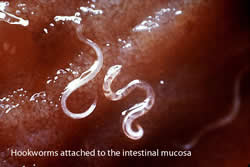Difference between Bacteria and Parasite
Key Difference: Bacteria are single celled and prokaryotic organisms. They can be harmful as well as beneficial; it depends upon the type of Bacteria. On the other hand, Parasites are organisms that live in or on the hosts and derive their nourishment from the hosts.
.jpg) Bacteria are single cell plant organisms and they are very small in size, measuring about a few microns in size (micron=0.001mm). Bacteria are different from other cellular forms as they do not have any nucleus. Some of them are harmful and some of them are beneficial, it all depends upon the type of bacteria. They help in digestion and also keep the number of bad bugs under control.
Bacteria are single cell plant organisms and they are very small in size, measuring about a few microns in size (micron=0.001mm). Bacteria are different from other cellular forms as they do not have any nucleus. Some of them are harmful and some of them are beneficial, it all depends upon the type of bacteria. They help in digestion and also keep the number of bad bugs under control.

On the other hand, Parasites are organisms that grow, feed, and shelter on or in different organisms. The organism that is used by the parasite for the survival is known as the host. Parasites generally do not provide any benefit to the host. It is important to mention that some scientists and researchers do not include single-celled organisms, such as Bacteria, Amoeba or Viruses that can cause disease, into the category of Parasites.
The characteristics are listed below:-
|
|
Bacteria |
Parasites |
|
Structure |
Most bacteria consist of a ring of DNA surrounded by cellular machinery, contained within a fatty membrane. |
Parasites are organisms that grow, feed, and shelter on or in a different organism. The structure differs from one another. |
|
Etymology |
From Greek baktērion, diminutive of baktēria 'staff, cane' |
From Greek parasitos meaning (person) eating at another's table |
|
Examples |
Actobacillus, nitrogen-fixing bacteria, Bifidobacterium, Helicobacter pylori and Staphylococcus |
Tapeworms, fleas, and barnacles |
|
Size |
Microscopic |
Variable sized |
|
Categorization |
Bacterial types vary by shape and size. They are broadly divided in four categories:-
Coccus – They are spherically shaped and may live as standalone or pair up to form colonial structure.
Bacillus- They are rod shaped and also includes the bacteria that causes Anthrax.
Rickettsia- They behave like viruses and are responsible for typhus, Rocky Mountain Spotted fever and Rickettsialpox, a body rash.
Mycoplasma- They do not contain a cell wall and are either in a rod or in a sphere shape.
Spirillum: These are corkscrew or spiral shaped bacteria. |
Broadly divided into three categories:-
Obligatory Parasites- These parasites can only survive in a host and therefore go directly from one host to another.
Temporary Parasites- These parasites spend only part of their lives as a parasite and another part as free-living organism.
Facultative Parasites- These organisms are normally free living and infect a host only by accident. |
|
Example of Foodborne Illness |
Clostridium perfringens is a bacterium that causes infection and forms spores in adverse conditions. Incubation: 10- 12 hours Symptoms: abdominal pain, nausea, diarrhea, fever, headache, vomiting usually absent Foods: stews, gravies, beans Sources: soil, animal and human intestinal tracts |
Trichinella spiralis is a parasitic roundworm Incubation: 2-28 days Symptoms: flu-like, swelling around eyes, extreme sweating, hemorrhaging, Foods: undercooked pork Source: domestic pigs, bear, walrus |
|
Growth |
Bacteria grow in food and in the body. |
Parasites can not grow in food, only in the body.
|
|
Cell structure |
Simple |
Complex |
|
Diseases |
Cholera, tuberculosis, lyme disease, pertussus, salmonella, staph infections, strep throat, leprosy, tetanus, diptheria, E.coli, flesh eating (necrotizing fascitis), rickets etc. |
Anisakiasis, giardiasis, cryptosporidiosis, trichinosis, taeniasis, etc. |
|
Source of Energy |
Seize energy from the same essential sources as humans, including sugars, proteins, and fats. |
Feed on the nutrients, cells and organs of the host. |
Image Courtesy: newhealthguide.org, io9.com









Comments
why bacteria is easier to treat than parasite and fungi?
hussein ayeub
Mon, 01/05/2015 - 07:00
Add new comment